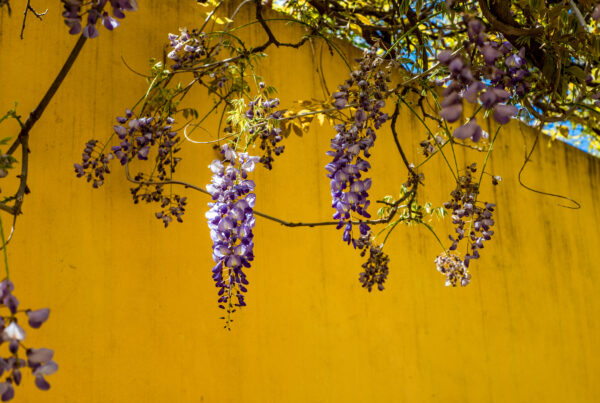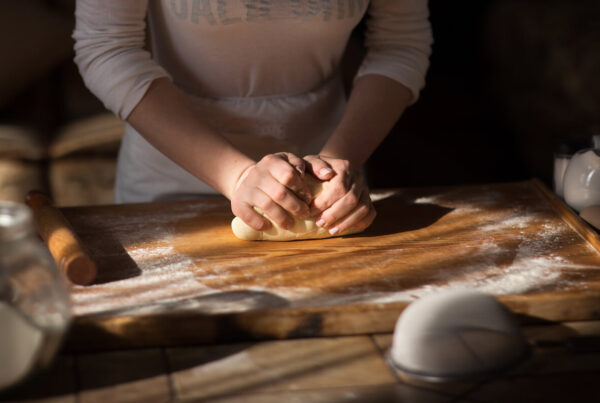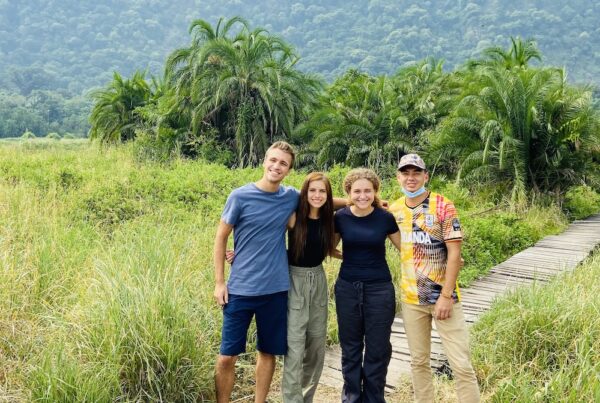The same mentality I used to get through my unmedicated 44-hour labor with Winnie, I now find myself using in the days of COVID.
When I was 6 centimeters dilated, my labor hit a serious pause, and for 15 hours I continued to have contractions but I did not dilate. (Don’t freak out, Winnie’s heart rate was perfect.)
At a certain point, after my doctor checked for progress, he told me I was doing great and I was now 6.1 centimeters dilated.
Then 6.2.
A few hours later, I was 6.3.
I knew there were no measurements of “6.1”, “6.2”, “6.3”. I was 6 centimeters.
And amidst all the discomfort and pain, while nothing seemed to be happening, Dr. Riley found a creative way to encourage me, and it worked. I kept walking, kept breathing, kept focusing on what was happening at that moment.
If I stopped to consider how long I’d been having contractions with nothing happening, or how long I had left to go, I knew I’d start to mentally deteriorate. I was walking a mental tightrope and I needed to live entirely in the moment.
So I focused on the task at hand, which was, finding the best way to get through each wave of intense pain.
Occasionally, in-between contractions when I was lucid and pain-free, I’d wonder what I was even doing.
What purpose was all this rhythmic tedium even accomplishing?
Could I just stop it all?
Just escape and go spend the day at the beach?
But then the creeping burning sensation in my lower half would start up again, and draw me back to my current reality. I’d hear my daughter’s heart rate and knew something bigger was happening.
In order to get out of this, I had to go through it. And it wasn’t going to be getting easier.
My life in Uganda is 6 centimeters dilated and has stalled out.
Things have become constricted around us, the same way my body constricted in labor, and we are forced to bow down to the rhythms at hand.
In some ways, being a mom to young children and living in a rural place lends itself well to this time. Our family has definite routines. COVID or not, we are home most mornings and every afternoon.
Now that we are expected by President Musevini to only leave for food or medical-related outings, we are pretty much here all. the. time.
I’m thankful that I’m not 20 years old, struggling at home alone and wishing I was backpacking through Greece with my best friends instead. We’re central and settled in nicely. My kids are doing a lot of similar things that they would be doing in our house in San Diego, except with friends next door and more space here to roam.
Our new home is basically in the middle of a park. There are huge trees everywhere, grass as far as my short-sighted eyes can see, a cocoa farm, a carpenters workshop, and six other missionary homes located within yelling distance.
This has been the number one game-changer during this time.
We think the local government is unofficially considering this compound its own big-white-person-family, so we can move about freely outside our homes.

Getting creative on lockdown: A few teammates started a ping pong tournament last week using their (short) kitchen table!
But in other ways, this time has other challenges that are unique to here.
The sobering fact that the borders are closed.
The fact that we are in a country with no ICU’s.
Limited ventilators for others if they need them and limited ventilators for us if we need them.
We’ve talked, thought about, and weighed those costs. And we walk forward in trust that this is where we are called.
I’ve just started working at the hospital this last month and am getting introduced to the level of desperation and lack of resources here in a more intimate way. Last week there was no running water available in all of the hospital. During a pandemic. No water.
The week before that I saw a doctor trying to decide between which infant should get the only oxygen left.
And the week before that, in the middle of a newborn resuscitation, our old equipment blew a hole in it as we were attempting to get breaths into a baby that wasn’t breathing. He survived, but barely.
So even though my kids get to run around on green grass all day during quarantine, the situation outside of our fence is far from enviable.
We are living where extremes are not hidden from each other, rather they pull up as close as possible, and stare each other in the eye.
The fact that my family and I are often on the side with the most privilege, carries its own weight.
During the time of COVID, what does serving as a missionary in Bundibugyo look like?
Usually every two months we would take an 8-hour car ride to Kampala to stock up on major groceries. So, as our 2-month mark of being here just approached, our groceries were running thin.
So, last Saturday, I walked to the local market with my friend Robinah to buy some fruit. And as I was handing over some cash for an overripe pineapple, people began to run and hide.
“We have to go back home,” Robinah said. “The police are here.”
The police had rifles and long sticks and were chasing people into their compounds to beat them for being out together. I put my head down and walked as quickly as I could all the way home, turning around just once to say good-bye as we parted ways.
Initially, when the police started chasing people I found myself thinking I was excluded because I was a foreigner. He wouldn’t chase me too, I thought. I’m not doing anything.
But then I looked around and saw that no one else was doing anything either. And I realized there was nothing inherently more special about me. So I got out of there.
The Kacie before children may have lingered to see what was happening, but the message was made pretty clear and was twenty feet behind me in a uniform with weapons.
We were completely out of fruit so I was glad to get that precious pineapple for the kids, but Mike could tell immediately in my eyes bulging with adrenaline that it was not a typical trip to the market.
In order to get out of this, we have to go through it. And it isn’t getting easier.
We took stock of our final groceries imported from Kampala. Some frozen chicken fillets and mozzarella cheese in the deep freeze. A bag or two of lentils. Dried salty figs. A can of corn, and garbanzo beans.
I felt equal parts excited by the challenge of only eating locally (there is food here, rice/beans/flour/sugar/etc) and bummed at the lack of familiar culinary choices the future would hold.
Then, one of our teammates came up with a great idea. He hired a motorcycle driver to deliver us food from the next biggest town 2 hours away, which ended up being pretty amazing. We got things like cucumbers, broccoli, pasta, pesto, and even more chicken!

The local market has seen a dramatic reduction in the number of vendors and buyers due to COVID restrictions.
When I talk to my family and read the international news, I am aware that each country, city, town, family, and person is having its own unique “COVID labors.”
And like a busy labor ward, we are doing it side-by-side, hearing each other groan and twist in discomfort – but largely each on our own path.
This morning I saw I had all the ingredients to make a Dutch baby.
But just as the sweet pancake smell began wafting through our house, Mike went to answer a quiet knock on our front door. It was a man with a letter, dated April 25, 2020.
He woke up to write this:
Hello Mike,
Greetings and best regards. Things are not good at home because of hunger, we are starving. I am kindly requesting you please to help me with fifty thousand shillings (less than $15) only to help me get food for my family this week. The food I had is finished.
Please. Please, Sir, help me at least in future if you get work I work for it.
Thanks much.
Yours in service.
We are starting to see the trickle-down effect of the restrictions put in place to keep coronavirus from spreading around.
The markets are shut down (too crowded), people are unable to sell their produce (can’t travel), and therefore have an even more limited income, there is a sense of worry about food insecurity for the poorest and most vulnerable.
Every day we have a few people knock on our door and out of their desperation ask for something. Mostly it is money. We’ve been asked for school fees. For clothes. For medications.
At the beginning of the week, someone even asked us for a small bottle of petrol to pour over his elderly mother’s hand. I didn’t quite understand everything that was happening except his mom’s hand hurt and she uses petrol to make it feel better.
“Just remember,” Mike said as he handed it over, “that stuff is highly flammable”.
I couldn’t help but laugh as my morbid nurse humor broke through, imagining a little old lady with her hand ablaze. That probably shouldn’t be funny, but when you’re stalling out at 6 centimeters in COVID labor, you lose some inhibitions and tact I suppose.

Kacie has begun working at the hospital and local nutrition clinic. Here she is with the team leader, Dr. Jennifer Myhre.
The great leveler and something Mike and I had already prepared for before leaving the U.S. was virtual communication.
I was sad to be leaving all the people we know and love, and knew that Facetime and Zoom would only offer us a fraction of the connection we were leaving behind – but for those willing to meet us in our limitations I was grateful.
Now, the entire world has to communicate this way- and everyone is feeling the incompleteness of being apart.
The strain of sacrifice.
Strangely enough, I feel less lonely and more united knowing we are all missing out on each other. That’s selfish, I know. And seeing how lonely my loved ones seem makes me wish they were all together, drinking wine and laughing, but in the meantime, there is a sense of solidarity until our restrictions lift.
But who knows when that day will be?
Questions circle around, like vultures with nowhere to land, except on the President’s next speech. Something new to subsist on until we realize there are fewer answers and more questions.
When can we drive in a car again?
When can we legally leave our compound just for fun?
When can we travel around this country we just arrived in?
When will we not have to wash our hands with bleach water before entering every shop?
When will the Ugandan church open up?
When will we be able to have Vincent’s family over for dinner?
When will the people we know and love find equilibrium?
When will we be able to care for patients and breathe freely without an N-95 mask on?
And on and on and on.
But I think they all boil down to this.
What will the future look like?
Spending too much time considering these things can make my head swirl. Just like labor, the questioning comes in the pause.
In the place where there is time to think, a moment to recover. In between people’s needs and asks, and the typical demands of daily life. In the lull right after lunch and before dinner. Or in my husband’s and my mutual exhale after we get the kids down to sleep.
I cannot control how my COVID labor will unfold, or the outcome, or yours.
But in order to get through I have to do what I have done for all my 3 babies, and with all the moms I’ve labored with.
I must prepare as best I can, then turn my focus to whatever has been dealt to me at this moment and meet it head-on with patience, acceptance, and prayers for extra grace.
And interestingly enough, there will be something birthed from all this.
What? I don’t know.
I’ve started a daily youtube workout with some girl on there named Heather Robertson hoping that one part of my COVID baby may take shape as a bundle of new endorphins and the ability to do a lot of push-ups.
Mike and I have been going through a short marriage series called “Cherish” from a really great author named Gary Thomas. I’ve loved Gary Thomas’s work for a long time, but the actual interviewer did a really mediocre job.
Yet in a moment of his mediocrity, we were set off into one of the hardest and longest laughs we’ve had in a while.
May this COVID baby be borne of connection, love, and humor.
We’re not leaving our land much, so like the rest of the world, we’ve decided to dig it up. Plant a garden.
Our friend (also the person we’ve hired to help our family with childcare, Ugandan cooking, or cleaning) is coming to plant the left side. She wants sombe, and dodo, and beans for her family. “And you can have it for your family too,” she says. We will plant the right side, with herbs, tomatoes, squash.
May our COVID babies come out nourished by resources shared in a needy time.
I’ve been signing on to Zoom at 5:30 am to take part in our weekly Bible study (in San Diego at 7 pm). This group has adapted to Zoom really well, because of their ability to allow for long awkward silences. I used to panic when it got quiet, but I’ve come to see that is when the jewels come out. And with everyone in the comfort of their own homes, snuggled up with dogs or under their fluffy blankets, we are getting even deeper in our sharing. Last week we watched Tim Keller’s video, Trusting God in Difficult Times, and spent some time talking about life, and pain, disappointment, and suffering.
May all of our COVID babies be well-adjusted to their new life knowing they can weather the storms because Christ is the captain and this life is not all there is.
Our time on earth is just a blip compared to the perfection and beauty that await afterward.
I find solace knowing that even in the emotionally, spiritually, financially, or physically tight squeeze (or choke) many of us may find ourselves in-it cannot and will not last forever.
We will all pass through this having sweat, given all our might, prayed for deliverance, and perhaps recognized something beautiful, sleeping, with heart-beating- in the process, something new to behold.






